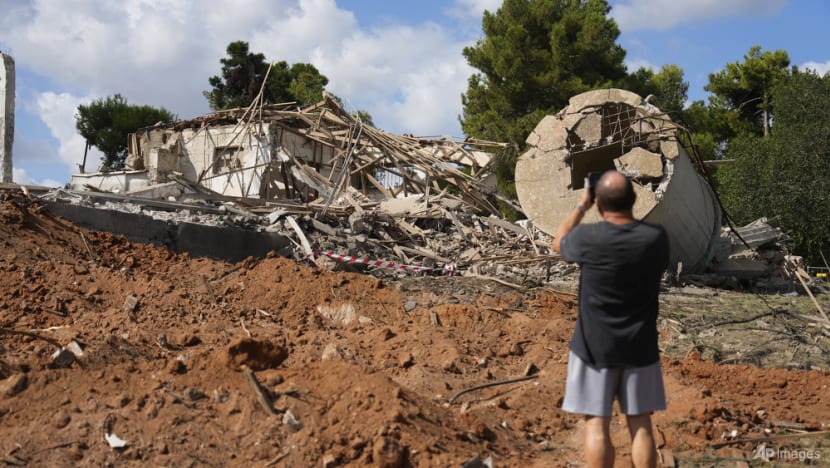Commentary: China’s support for Iran in conflict with Israel is a double-edged sword
China’s track record in mediating Middle Eastern disputes is mixed at best, says RSIS’ Dr James M Dorsey.

A man takes photos of a destroyed building that was hit in Iran's missile attack in Hod Hasharon, Israel, on Oct 2, 2024. (AP Photo/Ariel Schalit)

This audio is generated by an AI tool.
SINGAPORE: A recent Chinese declaration of support for Iran in its conflict with Israel could prove to be a double-edged sword.
The declaration put the final nail in the coffin of Chinese efforts to remain on the sideline of the Middle East’s multiple conflicts and maintain good relations with all in the region.
It is likely to complicate relations with Israel, already strained by Chinese support for Palestinian rights and condemnations of Israel’s war conduct, the rise of anti-semitism in China, and Israel’s pre-Gaza war curbing of technological and infrastructure cooperation with the People’s Republic because of US pressure.
At the same time, declaring support could increase Chinese influence in Iran, one of the few regional players where China, alongside Russia, may have the leverage to counsel moderation as escalating tensions with Israel threaten to spark an all-out Middle East war.
HOW MUCH LEVERAGE DOES CHINA HAVE?
With military sales to Iran dwindling, Chinese influence stems from common geopolitical interests in countering US influence and the People’s Republic’s imports of Iranian oil.
China, the world’s biggest oil importer and second-largest consumer, buys 90 per cent of Iran’s oil exports at a significant discount to world prices in defiance of US sanctions.
Iran’s US$2 billion a month in oil sales to China account for an estimated 15 per cent of overall Chinese oil imports and at least 5 per cent of Iran’s economic output. The exports bankroll the Iranian government and provide the cash needed for imports.
China’s interest in preventing an all-out Middle East war is compounded by the fact that an even larger share of China’s oil imports travels on ships past Iran’s shores that Iranian missiles could target.
Iran has threatened to respond harshly to expected Israeli retaliation for the Islamic Republic’s recent missile attack on military and intelligence targets near Tel Aviv. The attack was in response to multiple Israeli strikes against Iranian targets in recent months.
The nature of the Israeli retaliation and how Iran responds could determine whether the hostilities spin out of control. Iran said on Sunday (Oct 13) that it has "no red lines" in defending its people and interests, as reports swirl that Israel has narrowed down a list of targets to attack in Iran.
Saudi Arabia and the United Arab Emirates will have noted China’s support for Iran, even if they refrained from public comment.
The two Gulf states have designated Hezbollah as a terrorist organisation, supported the internationally recognised, West Bank-based Palestine Authority rather than Hamas, which they see as an offshoot of the Muslim Brotherhood, and fought a war against the Houthis.
Like Hezbollah, Saudi Arabia and the UAE see the Brotherhood as a terrorist movement.
Even so, the kingdom and the Emirates fear that they could be dragged into a regional war, particularly if the next Israeli and Iranian moves target oil and energy facilities in the two countries.
The Gulf states will agree with China’s affirmation of principles of international law but be concerned that China’s support could embolden Iran.
Last week, Iranian Foreign Minister Abbas Araghchi paid visits to Saudi Arabia and other Gulf states as Iran cautioned them against allowing their airspace or foreign military bases to be used against the Islamic Republic.
The Gulf states have sought to reassure Iran that they would remain neutral in Iran’s conflict with Israel.
Israeli warplanes attacking Iran would have to refuel on their return flight midair in Gulf airspace or at bases somewhere in the region. Azerbaijan was touted as a potential refueling base when Israel contemplated attacking Iranian nuclear facilities in the 2010s.
While reassuring Iran, Saudi Arabia is also working behind the scenes with the United States and France to exploit setbacks suffered by Hezbollah at the hands of the Israelis to weaken the group’s political influence in Lebanon.
CHINA’S MIXED TRACK RECORD IN THE MIDDLE EAST
China declared its support for Iran during a meeting last month between Foreign Minister Wang Yi and Iranian President Masoud Pezeshkian on the sidelines of the United Nations General Assembly.
Wang Yi told Pezeshkian that China backed Iranian efforts to safeguard the country’s “sovereignty, security, territorial integrity, and national dignity.”
The declaration of support followed a series of Israeli strikes at targets in Iran, Syria and Lebanon that potentially violated international law.
Iranian support for its militant non-state Arab partners, including Hamas, Hezbollah, and Yemen’s Houthis, with whom Israel has effectively been at war for the past year, prompted the strikes.
The strikes included the bombing in April of the Iranian consulate in Damascus, the killing in Tehran in July of Hamas political leader Ismail Haniyeh, and the targeting of several other Islamic Revolutionary Guard Corps (IRGC) officers in Syria and Lebanon.
The Chinese declaration took on added significance with the assassination in Beirut of Hezbollah leader Hassan Nasrallah in a bombing that also killed a senior IRGC commander, Brigadier General Abbas Nilforoushan.
Nevertheless, Chinese support may ultimately amount to little more than a moral boost.
China’s track record in mediating Middle Eastern disputes is mixed at best.
Last year, Saudi Arabia and Iran handed China a success on a silver platter by agreeing to reestablish diplomatic relations under Chinese auspices.
The agreement was largely negotiated in the two preceding years with little, if any, Chinese input.
In the ultimate analysis, China is discovering that its prominence as a trade partner does not necessarily translate into geopolitical clout. Nor does it by definition allow it to remain on the sidelines of the Middle East escalating disputes.
Dr James M Dorsey is an Adjunct Senior Fellow focused on the Middle East at Nanyang Technological University’s S Rajaratnam School of International Studies, and the author of the syndicated column and podcast, The Turbulent World with James M Dorsey.

















